 JOHN’S A NATURAL speaker and an interesting guide. My ears sometimes have a hard time keeping up but I’m picking up a lot about Paraguay from John’s upbringing with the Bruderhof Communities and the relationship to the Mennonites.
JOHN’S A NATURAL speaker and an interesting guide. My ears sometimes have a hard time keeping up but I’m picking up a lot about Paraguay from John’s upbringing with the Bruderhof Communities and the relationship to the Mennonites.
Paraguay’s War of the Triple Alliance and the Chaco war with Bolivia, allegedly a war fomented by US oil interests, shaped the country in indelible ways. The resulting depletion of the Paraguayan population was probably instrumental in Paraguay granting sanctuary and autonomy to these immigrant groups where other countries were flatly rejecting them. Finally, shaping a society retaining a traditional feel of family, community and sense of freedom much like I remember growing up with during the sixties and seventies in England and Wales.
 Two days at Laguna Blanca had been enough rest and recuperation for me and I felt ready to go even though I didn’t get round to walking the trails around the lake.
Two days at Laguna Blanca had been enough rest and recuperation for me and I felt ready to go even though I didn’t get round to walking the trails around the lake.
Mechanical problems on John’s Kenton seemed to dog our departure. Kickstarting and pushing was unsuccessful and we checked the fuel and the spark plug before discovering the kill switch on the handlebars was switched off. I was surprised the Kenton had one.
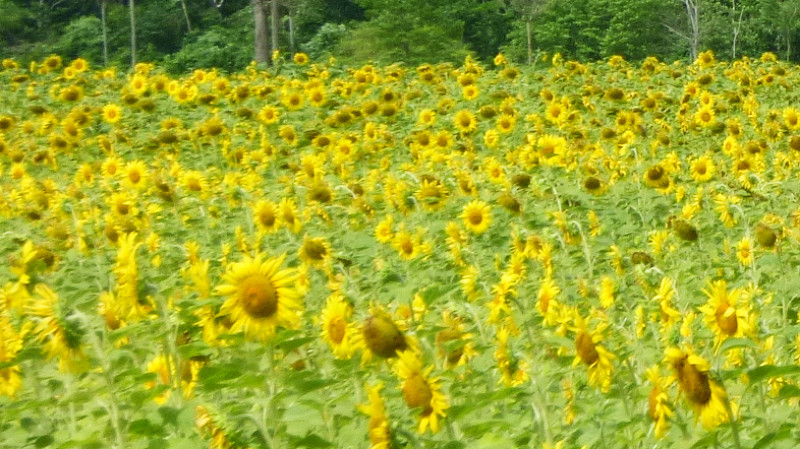 We exited along the sandy track next to the sea of Sunflowers bathing their faces in the morning sun two miles to Route 11. Route 11 was a gentle start to the day and we soon arrived in Nueve Germania, proudly displaying the colours of the German flag painted on bins and signposts. We stopped to top up John’s phone credit and took advantage of the nearby Cafe for a buffet lunch. “Weigh and Pay.” Which means, gram for gram, steak costs the same as rice.
We exited along the sandy track next to the sea of Sunflowers bathing their faces in the morning sun two miles to Route 11. Route 11 was a gentle start to the day and we soon arrived in Nueve Germania, proudly displaying the colours of the German flag painted on bins and signposts. We stopped to top up John’s phone credit and took advantage of the nearby Cafe for a buffet lunch. “Weigh and Pay.” Which means, gram for gram, steak costs the same as rice.
 Our objective for the day was Puerto Rosario, the other side of the Mennonite town of Volendam. My first encounter with the Mennonites surprised me. I expected something like the Amish but everyone dressed like modern Europeans. I could have been in Hampshire or Hamburg. The first ones I’d noticed had fair hair and blue eyes sporting unhappy faces.
Our objective for the day was Puerto Rosario, the other side of the Mennonite town of Volendam. My first encounter with the Mennonites surprised me. I expected something like the Amish but everyone dressed like modern Europeans. I could have been in Hampshire or Hamburg. The first ones I’d noticed had fair hair and blue eyes sporting unhappy faces.
Two girls sitting outside a store ignored my greeting without a flicker in their expressions. Strikingly different to the native Paraguayans. The incongruity of our race in this environment reminded me of the movie “The Boys From Brazil:” a Nazi experiment gone wrong. This wasn’t reflected in my later visit to Friesland though: friendly Europeans that spoke English and German with the atmosphere reminiscent of a rural village in bygone England.
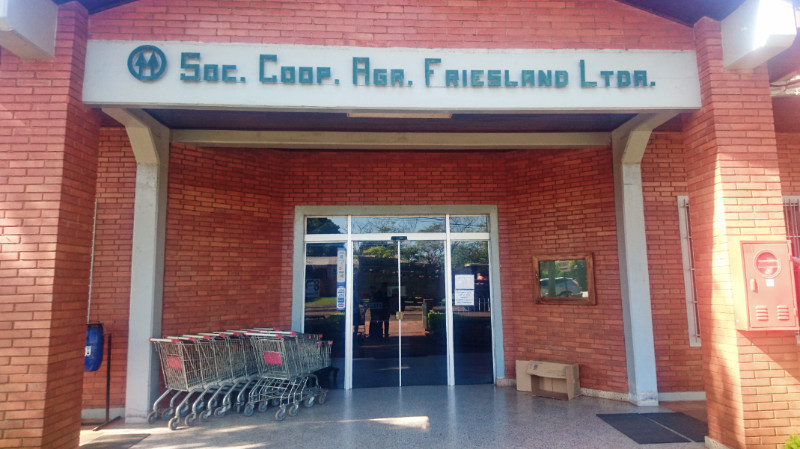 A late stretch of dirt road had me sweating up a hot thirst by the time we reached Puerto Rosario and we took it in turns to strip off and bathe in the cool waters of the Rio Paraguay beneath the iconic tree, symbolising the Bruderhof’s arrival at Primavera, while one of us kept an eye on the bikes. This tree John helped the town save from the erosion of the bank by the Rio Paraguay and a negligent, idle town Mayor a few years ago. John, a foreigner with no claim to Puerto Rosario. His proposal to pay for shoring up the riverbank to save the tree shamed the local Mayor into doing the job he is paid to do.
A late stretch of dirt road had me sweating up a hot thirst by the time we reached Puerto Rosario and we took it in turns to strip off and bathe in the cool waters of the Rio Paraguay beneath the iconic tree, symbolising the Bruderhof’s arrival at Primavera, while one of us kept an eye on the bikes. This tree John helped the town save from the erosion of the bank by the Rio Paraguay and a negligent, idle town Mayor a few years ago. John, a foreigner with no claim to Puerto Rosario. His proposal to pay for shoring up the riverbank to save the tree shamed the local Mayor into doing the job he is paid to do.
 We were on John’s historic turf and we stopped by to say hello to a couple of his old friends but (against our tentative hope) discovered nowhere nearby to stay for the night. This meant hitting the road to Itacurubi 25 miles away. Not so bad but it felt a lot further since it had already gone 5pm and I’d thought I’d hit the finish line for the day and was already unwinding.
We were on John’s historic turf and we stopped by to say hello to a couple of his old friends but (against our tentative hope) discovered nowhere nearby to stay for the night. This meant hitting the road to Itacurubi 25 miles away. Not so bad but it felt a lot further since it had already gone 5pm and I’d thought I’d hit the finish line for the day and was already unwinding.
John’s phone needed a boost so I hooked it under the rubber strap on the handlebars, like I do my own, and plugged it into the USB socket before we set off. Darkness had fallen before we arrived at Itacurubi. Passing under a gantry with the lights of oncoming traffic, Bang! I hit a pothole; hard. The force of the impact jolted the phone out from under the strap and the cable now hanging by the wheel was no longer attached to a phone.
I checked my front wheel which I was relieved still looked round and the tyre was still up and I quickly turned round to find the pothole and scan the road immediately after it. There it was, about 10 meters from the pothole just over the centre line in the opposite lane. Luckily there was no traffic and I quickly bent down to retrieved it without having to dismount the bike. John was waiting at the next roundabout, the turnoff to Itacurubi. We had arrived. Apart from a cracked screen protector, the phone survived and was now at 55% charge.
John knows the owners of HSS Hotel so we got a good deal on a room. One of the cockerels was up all night disturbing the peace and found himself to be the source of dinner the next day. I saw one of the Senoras haul him out of a shed by his feet and neck and never saw him again.
We missed dinner at the hostel that night.
Itacurubi del Rosario is the town near where the Bruderhof established their Primavera community after retreating out of the harsh environment of the Chaco. The Bruderhof are a peace-loving, pacifist Christian community that were helped to settle in Paraguay by the already established Mennonites. The Mennonites share the same Anabaptist faith and some of the national origins of the Bruderhof. The Bruderhof arrived in Paraguay in 1941 first escaping Germany to Britain and then escaping Britain’s racism against Germans during the Second World War.
The Mennonites began to arrive at the turn of the last century. Some of their Canadian colonies left Canada after the government wanted their dominant language taught in schools to be English instead of German. The main differences between the two sects are that the Mennonites maintain the concept of ‘Private Property’ while the Bruderhof give up private belongings in favour of community.
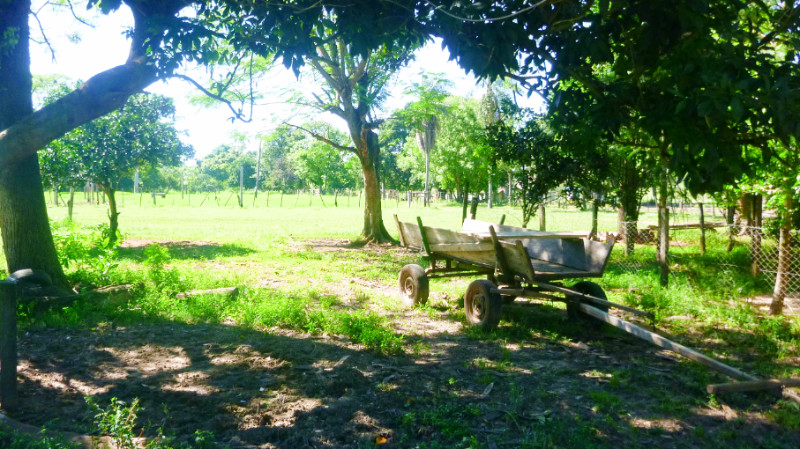 John recounted his upbringing around the woods and rivers of Itacurubi. these days, the trees have been cleared, roads built and tracts of land divided into farms and ranches. For my Westernised eyes, I got a glimpse into the past where life was simple but work was hard. Wood-fired stoves, food growing in the next field or walking around the ranches. the Bruderhof land had long been sold off to the Mennonites but we still had access to the ranch and the river. We took the ranchers horses around the Estancia and later drifted down the river using a tyre and plastic bottles for floats like John used to in bygone times.
John recounted his upbringing around the woods and rivers of Itacurubi. these days, the trees have been cleared, roads built and tracts of land divided into farms and ranches. For my Westernised eyes, I got a glimpse into the past where life was simple but work was hard. Wood-fired stoves, food growing in the next field or walking around the ranches. the Bruderhof land had long been sold off to the Mennonites but we still had access to the ranch and the river. We took the ranchers horses around the Estancia and later drifted down the river using a tyre and plastic bottles for floats like John used to in bygone times.
 We spent a couple of days exploring and hanging out with John’s friends plus the ranchers drinking Terere, a kind of green tea sipped through a metal straw, similar to Mate in Argentina but served cold instead of hot, and passed around like a pipe of peace.
We spent a couple of days exploring and hanging out with John’s friends plus the ranchers drinking Terere, a kind of green tea sipped through a metal straw, similar to Mate in Argentina but served cold instead of hot, and passed around like a pipe of peace.
 We hit the road to Asuncion late Friday afternoon after a generous lunch by one of John’s old friends he grew up with.
We hit the road to Asuncion late Friday afternoon after a generous lunch by one of John’s old friends he grew up with.
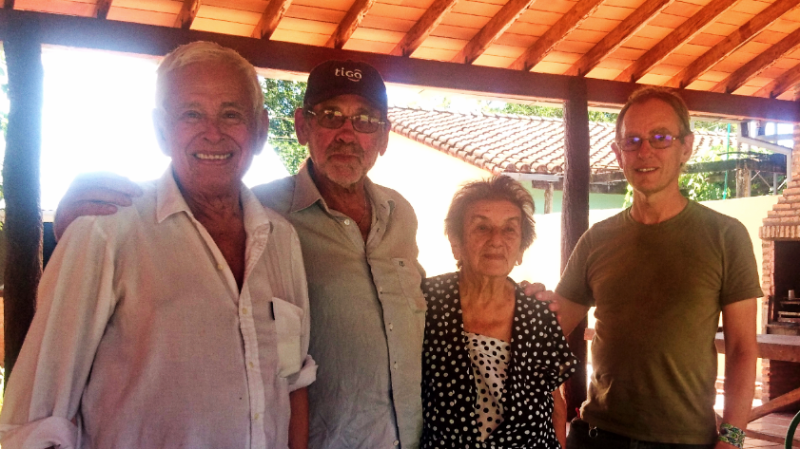
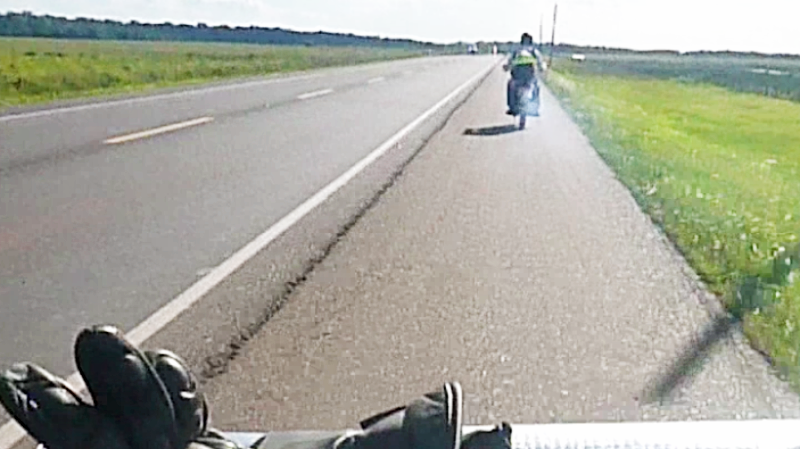 A swampy region obstructs the direct route south so we had to almost double back along the asphalt route east to San Estanislao (aka “Santani”) and then south-west along Ruta 3. I was following John and gradually dropping back. His exhaust was blowing out blue smoke – sometimes in thick clouds and the noxious fumes were becoming nauseating.
A swampy region obstructs the direct route south so we had to almost double back along the asphalt route east to San Estanislao (aka “Santani”) and then south-west along Ruta 3. I was following John and gradually dropping back. His exhaust was blowing out blue smoke – sometimes in thick clouds and the noxious fumes were becoming nauseating.
Along the way, there lives a family John has helped out in the past and we were expecting a warm welcome due to the firmly established bond. Turning off the main road, We slithered along the sandy ruts to a small plot of land. Apparently, this was one of the brothers that lived nearby. “This guy’s a bit of a wanker.” said John, casually dismounting his bike to approach the gate “Buen’ Dia, Mi Amigo…!” Our friend didn’t crack a smile or even make one step toward us to shake our hands, living up to his reputation.
After a few minutes of obliging pleasantries, we excused ourselves and I followed John’s spluttering bike up the lane to the main house and we both rode through the gate and onto the immaculate lawn. No-one home but the Gardener.
I didn’t understand the exchange coming from the ensuing phone messages but apparently, relations within the family had been soured and, as a result, we were denied access to the vacant house. John was livid after all the money he had donated and the time and energy he’d provided to the family.
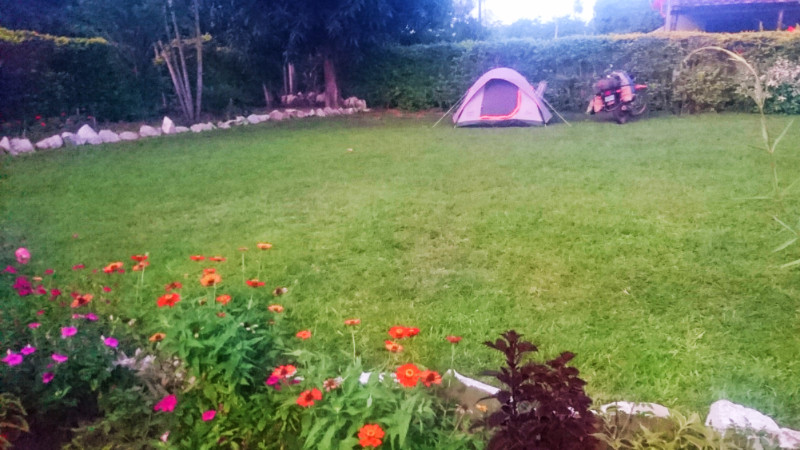 Plan B. We would stay in the garden. John borrowed a hammock from the wanker down the lane and I pitched my tent in the garden. The younger brother, Ariel, that lived next door gave us a proper warm Paraguayan welcome.
Plan B. We would stay in the garden. John borrowed a hammock from the wanker down the lane and I pitched my tent in the garden. The younger brother, Ariel, that lived next door gave us a proper warm Paraguayan welcome.
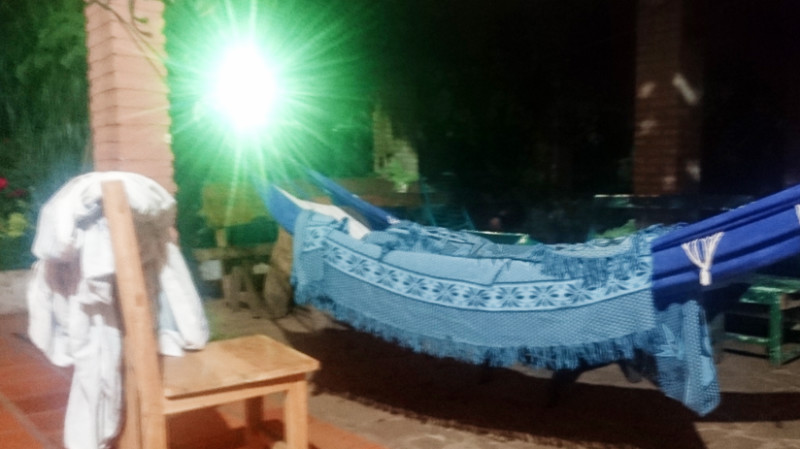 John’s hammock looked comfortable strung out under the grape vines. I pitched my tent up on the edge of the lawn out of snoring range. Just drifting off to sleep. I was disturbed by a rustling noise. Something was moving under the groundsheet near my head, about as thick as a child’s arm and already about a foot inward. Toads gathered at night to feed on the insects that drop off the street light next to the garden but this didn’t sound or move like a toad. I dropped my hiking boot on it and the creature withdrew. By its movement, I guessed it was a snake but I didn’t want to step out in the dark to find out.
John’s hammock looked comfortable strung out under the grape vines. I pitched my tent up on the edge of the lawn out of snoring range. Just drifting off to sleep. I was disturbed by a rustling noise. Something was moving under the groundsheet near my head, about as thick as a child’s arm and already about a foot inward. Toads gathered at night to feed on the insects that drop off the street light next to the garden but this didn’t sound or move like a toad. I dropped my hiking boot on it and the creature withdrew. By its movement, I guessed it was a snake but I didn’t want to step out in the dark to find out.
John bought breakfast from the shop the night before so we had a pleasant start to the day. Ariel’s wife brought hot water and milk for tea. Asuncion is not far so there was no rush to leave and after a leisurely farewell, we dicovered that John’s bike would not start, not even with the kill switch off.
Ariel ran it down the lane jumping up and down on it and we watched him disappear down the lane out of view listening for evidence of ignition. He returned after a short while with a mechanic and some tools and they set about dismantling the engine to discover warn piston rings and valves: the cause of all the smoke and oil loss and now not enough compression for starting a cold motor. Four of us drove into town to get the parts. Cheap and readily available, Kenton is a Mennonite company that builds motorcycles out of a mixture of Chinese parts and their own.
Meanwhile, Ariel’s wife brought out a hot lunch for us and we enjoyed the warmth of the family as well as the weather.
 The engine is a single cylinder overhead valve with tappets and pushrods. I hadn’t seen tappets since my Mk1 Ford Escort, so simple, it was a joy to observe. Normally you’d use a feeler gauge to set the valve gaps but not in Paraguay. Wiggle the rocker to see if it’s free but not too much. the bike fired up on the first or second kick and would now even start on the button. I’d not seen it start on the button before.
The engine is a single cylinder overhead valve with tappets and pushrods. I hadn’t seen tappets since my Mk1 Ford Escort, so simple, it was a joy to observe. Normally you’d use a feeler gauge to set the valve gaps but not in Paraguay. Wiggle the rocker to see if it’s free but not too much. the bike fired up on the first or second kick and would now even start on the button. I’d not seen it start on the button before.
We were on the road by three and soon penetrating the outskirts of Asuncion. I was wearing my fleece to protect from sunburn and although the hot air passes through the fabric freely, it did little for helping me keep cool. Running up a side street, we pulled up outside a luxurious townhouse that reminded me of my dad’s neighbourhood in Houston Tx. The Garage door rose to reveal a couple of cars, motorcycles and a pool table before re-emerging out of the cool shade to the rear patio and swimming pool.
Manuel is a good friend of John’s and after a brief introduction, Manuel disappeared down the road in his car inviting us to cool off in the pool until he returned. John showed me the room he was staying in, which was set out like a plush hotel with ensuite. Unfortunately, I wouldn’t be staying there and we were soon duelling with the city traffic as John escorted me to the El Jardin Hostel via a whistlestop tour of the city. It turns out, the tourist attractions in Asuncion are sparse and we’d just about covered them all in about twenty minutes.
As a Capital, the centre of Asuncion is small and finishes abruptly on the banks of Rio Paraguay where it looks across the water to Chaco-i and the Argentine border beyond. The El Jardin is a kilometre from the centre and their small Garden snugly accommodates my bike squeezing through the doorway with half an inch to spare for the luggage rack.
After the ritual hot cup of tea, while standing in the cool swimming pool, John left for the luxury of Manuel’s for the night.
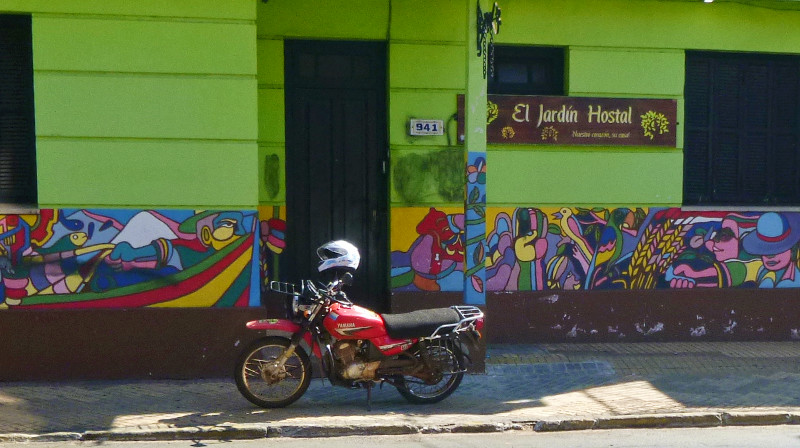 Despite the tranquil green sanctuary of the garden, there was a peculiar atmosphere created by the ‘guests.’ They were not conventional guests but kind of live here, lounging about the furniture, chain-smoking and socialising in their small familiar clique. The atmosphere felt glum and solemn and the regular guests were greeted without a smile or friendly gesture. It’s not that they were unfriendly… first impressions just felt cheerless with a heavy ambience. Still, I was here now. Five days was the answer I gave the registration form but I didn’t yet know.
Despite the tranquil green sanctuary of the garden, there was a peculiar atmosphere created by the ‘guests.’ They were not conventional guests but kind of live here, lounging about the furniture, chain-smoking and socialising in their small familiar clique. The atmosphere felt glum and solemn and the regular guests were greeted without a smile or friendly gesture. It’s not that they were unfriendly… first impressions just felt cheerless with a heavy ambience. Still, I was here now. Five days was the answer I gave the registration form but I didn’t yet know.
My six-bed dorm had only a single occupant. A tall tacit dutch guy named ‘Took’ or ‘Tool,’ or something similar, locked to his phone screen and, like most Dutch people, spoke English clearly but, unlike most Dutch people, as little as possible.
Laying on my bunk in the dark, with just the glow of an iPhone screen from the bunk across the room and the rhythmic pulse of the ceiling fan stirring the warm, muggy air, a memory returned.
Decades ago when my future spread out before me as an immense possibility, far further over the horizon than it does now; anything seemed possible. Decades of abundant careers and fortunes waiting to be tapped. Undiscovered fields of dreams and plans waiting to sprout fruit from any choices and actions I might take. Maybe a family, maybe adventure, maybe security or maybe a home in the sun and early retirement to enjoy the rewards and fruits of my labour…
Asuncion, Paraguay. A place I had been curious about more than 30 years ago as a possible future residence since reading WG Hill’s 5 Flags Theory on the creation of a life, wealth and freedom outside the rat race… and how to protect it once you had it…
Primavera: Springtime in Paraguay… I’d arrived at an ancient milestone in a forgotten dream approaching the autumn of my life and, on the face of it, found it disappointing… but somewhere along the way, I had already discovered the freedom I had been dreaming of all along…
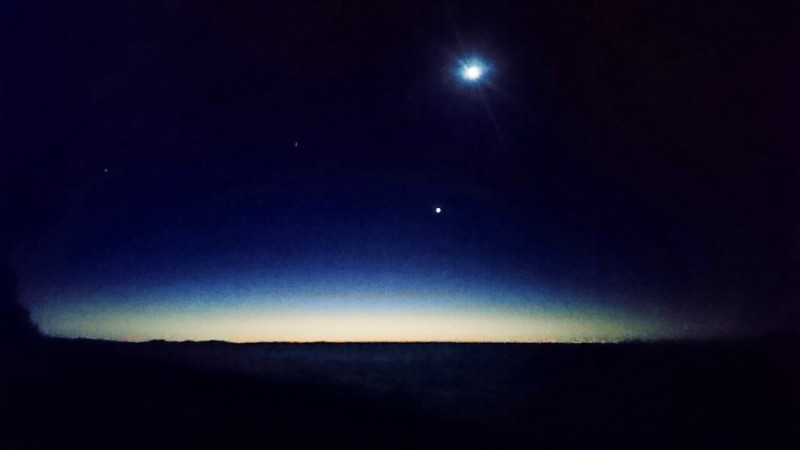



You would imagine peace loving pacifists to be a little more cheerful. Maybe they are, on the inside.
Interesting and well written blog! I’ll look forward to the next one
I’m jealous, wish I have the balls to do this years ago.
Too old now,but would have liked to “tip my toe” in South America.
I take my hat off to you with a bow.
Thank you, Peter. I myself waited until I had very little to lose to find myself on this path. I’ll summarise it in an about page soon but the skeleton of it is:
1. Wife left me in 2005 and I left her with the house and kids for their sake.
2. Credit Crunch took away my income in 2009 leaving me buried in debt 6 months later.
3. My pension fund sunk in the Caribbean with the Harlequin Hotel investment debacle.
4. I received compensation for the lost pension.
5. My apartment was foreclosed in October 2015. (I was already living in a van so I didn’t mind)
6. I bought an old yacht in St Martin, Caribbean, February 2016 and moved in as a liveaboard.
7. Hurricane Irma swept St Martin flat and sank my boat leaving me with a 55-litre rucksack of what I’d saved the day before.
8. Invited to crew on a yacht delivery from Turkey to Colombia.
9. Wake up every morning somewhere in South America. Amazing continent and people.
LifeWithGlee was named when I started the blog at the same time I bought the boat. It’s a travel log and memoir of life with Glee and life’s journey thereafter…
At the core of it is “The Art Of Going With The Flow.” Bingo, got a good subtitle and more focused purpose for writing – thanks for that…
Beautiful lyrical writing as always Shep. John sounds an interesting companion glad you found each other. x